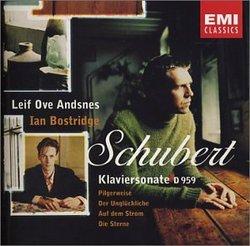Light and shadow
Jeff Abell | Chicago, IL USA | 10/22/2002
(5 out of 5 stars)
"Leif Ove Andsnes is an astonishing pianist, who can play Haydn brilliantly, bring out the sarcastic wit of Shostakovich, or bask in the dreamy sentiments of Brahms. As he states in his liner notes, it is perhaps inevitable that he has come to Schubert at this point in his career. Schubert benefits from all the things Andsnes excels in: dazzling technique, a fresh point of view, and dramatic intensity. The Sonata in A, one of three big sonatas written the year he died, is filled with the mixture of light and shadow that distinguish Schubert's best works. (Consider the slow movement, where a plaintive little melody in F# minor is interrupted by this noisy, discontinuous outburst that some have characterized as a "nervous breakdown." Yet the scherzo movement that follows is one of Schubert's perkiest tunes. Go figure.) I already own Mitsuko Uchida's version of this sonata, a gorgeous account, but I find Andsnes reveals details and structural elements I didn't hear in Uchida's more inward version. Filling out the disc are some lesser known but beautiful lieder, sung incomparably by Ian Bostridge. Poet John Berryman called Schubert "grievous and sublime." This disc makes an excellent case for that description."
Andsnes takes a superficial view of Schubert
Santa Fe Listener | Santa Fe, NM USA | 01/08/2007
(3 out of 5 stars)
"Compared to virtuosic piano writing, Schubert's is child's play (a commenter below begs to differ), but beneath its surface simplicity, we now recognize a mysterious emotional world that eluded earlier generations. Post-Schnabel, the first interpreter to bring out the deeper Schubert in the late sonatas, many pianists have twisted and turned Schubert's lyrical line to their way of thinking. Andsnes begins the great A major sonta D. 959 quite abruptly, with clipped accents that are almost ugly. He remains aburpt and brisk throughout this long movement, and I for one thoroughly disliked it. Brendel offers much the same dry approach, and I guess Andsnes' purpose is the same, to give us a 'classical' Schubert close to Haydn and free of sentimentality.
The Andantino is a melancholy song without words, and Andsnes does well not to drag the tempo to accentuate the melody's sadness. But I don't find his touch or phrasing anything special. Again, he remains on the surface, eschewing Schubert's romantic inwardness for the most part. There's no doubt, however, about his sensitivity and sincertiy, as Andsnes' admirers would be quick to point out. The Scherzo is well executed but a bit flat-footed compared to the brialliant display of Pollini, my favorite piansit in this work. To be sure, Andsnes jsutifies his approach with alert changes of moood from bar to bar, something this mercurial movement demands. He breezes into the Rondo finale with a straight-ahead tempo that deprives the theme of expression, which is a shame. As good as Andsnes is at balancing melody and accompaniment in the contrapuntal dance, he prettifies the music, returning Schubert to the miniaturist he most definitely isn't.
I've given my response to each movement in order to make clear that I am not anti-Andsnes. His Schubert grates on my nerves at times, because I know how much depth the same sonata has in the hands of Richter, Pollini, and Schnabel, among others. If I want to hear good but not great Schubert, I can always turn to Goode, Lupu, and Perahia. I disqualify Uchida for her fussy mannerisms. As for the add-on Schubert songs, a feature of this series, Ian Bostridge has a voice I cannot abide, so I am not qualified to comment on an artist whose fame will always baffle me."


 Track Listings (8) - Disc #1
Track Listings (8) - Disc #1